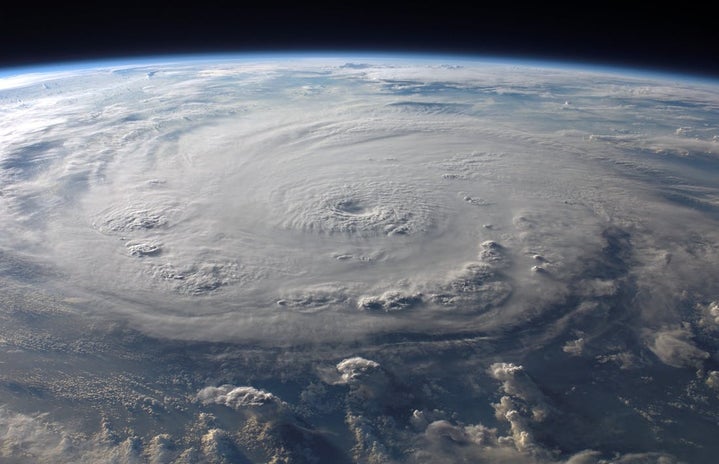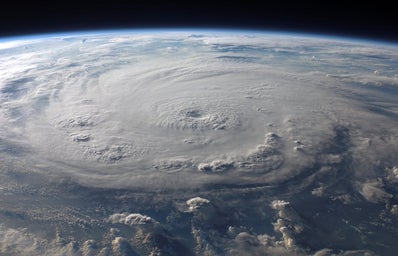Three days before Hurricane Milton made landfall in Siesta Key, the University of Central Florida announced it was closing to prepare for the storm, which was projected to track along I-4 straight toward campus. The announcement sent parents and students into a flurry of anxiety. While a majority of students evacuated, according to Associate Director for UCF Housing and Resident Life Gordan Adams, many decided to stay in their apartments or dorms to ride it out.
“Typically, what we find is that about maybe 20% of the students will stick around,” Adams said. “But you know, the thing that we have to take into consideration with every single storm is that every storm is different, and the way that people respond to it is often different.”
For many students, this was their first hurricane experience without their parents or guardians. For others, this was their first hurricane. Parents were not immune to this stress, with UCF Parent Facebook group posters riddled with concern.
One commenter wrote, “I am an OOS [out of state] mom and I want to bring my son home but he is worried he won’t be able to get back for Friday class. I’m so worried.” This was posted before the announcement of the Friday campus closure. Many parents shared these sentiments, uncertain of what would result from the storm.
Juliana Cabai, a UCF sophomore, stayed in her off-campus apartment during Hurricane Milton. She didn’t have much of a decision to make. Evacuating to her hometown in Fort Myers wasn’t a great option since it’s closer to the coast and already said to have a direct impact.
“I knew Hurricane Milton had a possibility to head south- which would directly impact my town. We were hit very hard by Hurricane Ian, and since Orlando is further inland, and I have all my belongings here, I decided to stay,” Cabai said.
In 2022, Fort Myers was hit by Hurricane Ian, a Category 4 storm with wind speeds up to 155 mph. The coastal town faced heavy flooding. Its barrier islands, including Sanibel and Fort Myers Beach, were severely damaged.
Similarly, Brandon Garrett, a junior at UCF, couldn’t evacuate because his home was in Tampa. In every storm projection map, Tampa was going to be hit, either directly or by the outer bands. Tampa had already suffered two weeks earlier when Hurricane Helene churned through the Gulf Coast on its way to the Panhandle. The town wasn’t able to clean up all of the debris from Helene before Hurricane Milton came charging onto land.
When asked what he was most concerned about leading up to the storm, Garrett said, “I was most worried about the wind and the flooding because the parking lot in front of my apartment floods often, and I didn’t want the wind blowing something through my windows.”
Adams offered some insight into steps the university takes to prepare for incoming storms, including the roles of the Emergency Operations Center and the Office of Housing and Resident Life. For this storm in particular, UCF heavily encouraged students to evacuate to safer areas since there was uncertainty about whether or not Orlando would suffer a direct hit.
UCF takes several extensive steps when preparing for a hurricane, or any natural threat, courtesy of the Emergency Operations Center (EOC). Adams explained the purpose and work the EOC provides and how it works as a university to ensure student and staff safety.
“When you go in there, it looks like the news,” Adams said, describing the center and the 15-or-so television monitors broadcasting updates.
University leaders gather several times a day, reviewing forecasts from sources such as the National Weather Service, National Hurricane Center, and Doppler radar readings. From there, several meetings are held between the president of the university, the vice president, and all the heads of several operations, such as food services, housing, transportation, etc. If a storm becomes severe enough, then there are extra steps UCF has to take to create a shelter for students.
“There’s a whole set of things we have to do ahead of time,” Adams said.
UCF is responsible for selecting the most appropriate buildings to convert to shelters, lining up staff and university police officers to man them, and outfitting them with the supplies needed to house students. To Gordan Adams, being prepared before hurricane season even hits is one of the most important steps any student can take. Juliana Cabai and Brandon Garrett each shared ways they prepared for the storm.
“I made sure to have food, water, and flashlights with me. I got any prescriptions I needed, just in case I couldn’t access pharmacies easily.”
– Juliana Cabai
Garrett shared similar sentiments, “Me and my roommates bought a bunch of water and food that couldn’t go bad if we lost power.”
Throughout some of the major storms in Florida history, UCF has been there for its students. Adams expressed a strong emphasis on preparations and how they can be “helpful and take out some of the anxieties.” The university has a very important website, according to Adams, which includes extensive information dedicated to being prepared for a storm.
“On that page, there’s videos on what you should do at the beginning of hurricane season. You should create a go bag,” Adams said.
When Hurricane Ian flooded multiple students out of their apartments, UCF took action. Adams explained ways UCF helped students affected by Hurricane Ian.
“Putting the [affected students] in touch with UCF resources, like UCF Cares,” Adams said. “Making sure that their professors know what they’re going through, getting them access to food, and by replacing some of the things that they lost.”
UCF goes to great lengths to protect its students in times of need. This includes working from dawn until dusk with the Emergency Operations Center to track and assess the storm and calling upon facilities, such as Knight’s Pantry (a free food market for students), to provide food and supplies for students. Though many students chose to evacuate ahead of Hurricane Milton, UCF made sure the ones who stayed were well taken care of.



